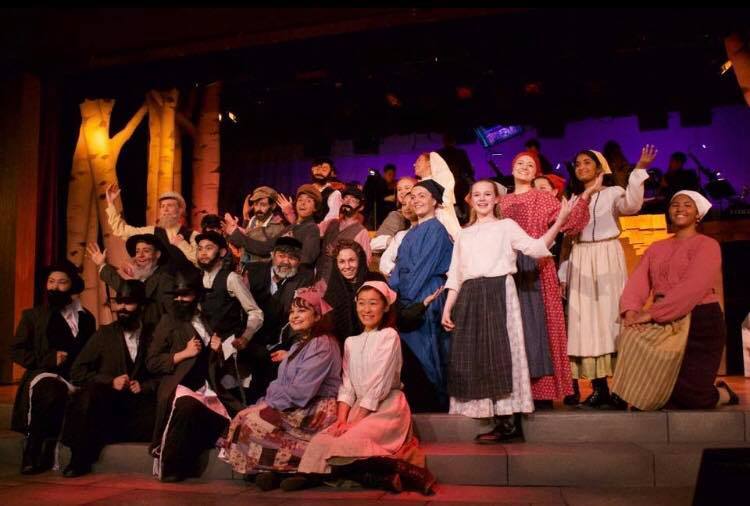Irvington Conservatory’s Revival of Fiddler” Ticket Sales Soar Through the Roof
“Fiddler on the Roof” sold an average of almost 250 tickets per night, reaching the highest average number of ticket sales for an Irvington Conservatory performance in the past decade.
April 30, 2018
On April 13, Irvington’s conservatory theater opened their doors to an eager audience to watch the 1964 musical, Fiddler on the Roof. The show opened with the ever-famous song, “Tradition”, embodying the theme of the show: grappling between respecting the culture of those who came before and progressing into the future through change. In a small Russian shtetl, or small Jewish village, located in the tight-knit town of Anatevka, Tevye, a Jewish milkman and father of five daughters, struggles with the acceptance of change in his community. Tevye, portrayed by Niko Le (11), is constantly tried by three of his rebellious daughters that are finally of age to marry. Le’s rich baritone voice rang through the theater during both his emotional highs and witty slides. Le’s well-timed punchlines and charm revealed the contradictory inner struggles of Tevye’s faith in a God”. Tevye’s wife, Golde played by Frankie Jensen (9), overloaded with housework and worry, stresses over the traditional marriage of her three daughters. Jensen’s beautiful mezzo-soprano voice powered through the stage and portrayed a strong wife and mother whose heart was in her family’s best interests. Throughout the night, the entire cast enthralled the audience with laughs, crisp choreography, and strong voices.
The story takes place early in the 20th century, highlighting the controversial stories of Tevye’s three daughters Tzeitel, Hodel, and Chava and their marriages. Each daughter tests the orthodoxy of marriage, typically clashing with the town’s humorous matchmaker Yente wonderfully delivered by Shea Daly (12). Izabella Hintzman (11), played the role of Tevye’s eldest daughter, Tzeitel, who goes against the grain by marrying for love, as opposed to an arranged marriage. Isabel Garcia (12) portrayed the second eldest daughter, Hodel, who takes progressiveness a step further by loving a man named Perchik, played by Nicholas Hintzman (9), an outsider who is labelled as a radical. Tevye’s third daughter, Chava, delivered by Felicia Chang (9), nearly throws tradition out the door by marrying a Russian man, Fyedka portrayed by Joshua Haskin (12). Every actor took their character and made it their own. No single actor spoke too fast or too slow with every word, the actors let the audience in on different aspects of their character, deepening the show’s impact and audience’s engagement.
The cast respectfully kept the allusions to Jewish culture accurate and understandable. Several scenes expressed the high-spirited energy of the community with songs such as “To Life” and “Miracles of Miracles”. One song in particular worth noticing was the intricate worth of notice was the bottle dance. Four dancers, Kiyomi Blackmun, Gisele Lajevardi (9), Callan Engstrom(9), and Anika Mathur (9) skillfully balanced a clear green bottle on their hat all while dancing through an intricate piece of choreography filled with bounces, twirls, and hops. Other pieces brought the audience near to tears such as the duet “Chavaleh” sung by Niko Le and Felicia Chang. The two’s powerful and harmonic voices swayed the audience with a story that highlighted the growth of the third eldest daughter through the fatherly eyes of Tevye. The most thematic scene of the show took place towards the end of act one. As Tevye shared a vivid dream about late townspeople with his wife, the entire cast appeared on stage in dream-like costumes and black light shone on the actors outlining them to appear as ghosts. Anika Goel (10) shocked the audience on stage as Fruma Sarah, the late wife of Tzeitel’s courter, Lazar-Wolf played by Roeen Nooran. Goel’s strong, controlled voice resonated through the theater as she entered in on a four foot tall platform, appearing as a floating ghost.
The cast’s excellence extended even to the ensemble as each actor seemed to have a character of their own adding to the communal effect of the Jewish town.
Adding to the overall effect of the show, the set depicted a strong picture for the home of Tevye and his family. Throughout the show, the set continuously changed and every part of the stage had a purpose. Every detail and effort that went into the family’s farm, kitchen, or the traditional clothing of the townspeople paid off and added to the homely atmosphere of Anatevka. The use of lighting throughout the show was near to flawless, using different color tones to effect different moods. Warm tones shone during heart-lifting scenes, cold colors during heavy scenes, and spotlights on highlighted actors. The costumes for each actor reflected their character. The men’s costumes especially, featured an article of clothing called tzitzit, a religious piece of clothing worn by men and knotted in ritual fringes.
A major part of the show took place behind the stage atop an important set piece: the orchestra. Directed by Mr. Anaya, the orchestra followed every cue while passionately flowing through each song with ease. Sophia Shih entranced the audience as the Fiddler, fiddling her way into a few scenes.
The audience was especially responsive opening night, cheering the cast on at every scene and laughing at comical gag. During curtain call, the audience gave the show a standing ovation before heading out to meet the cast.









